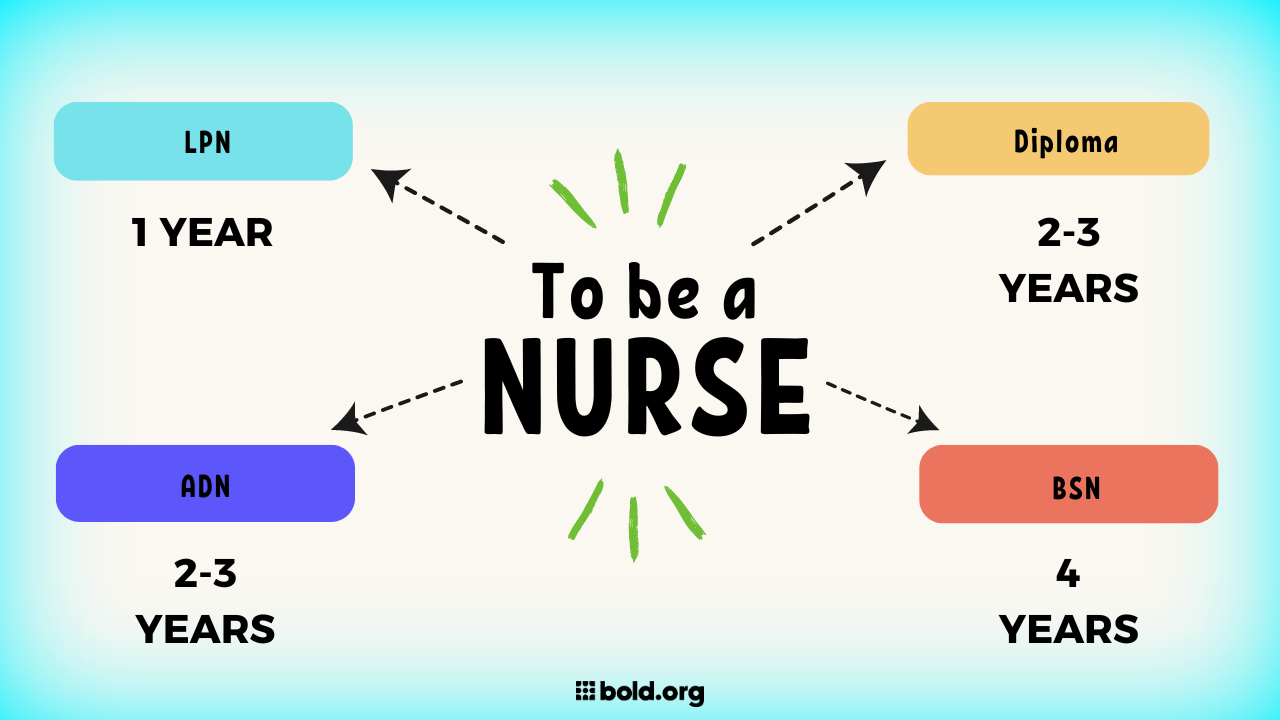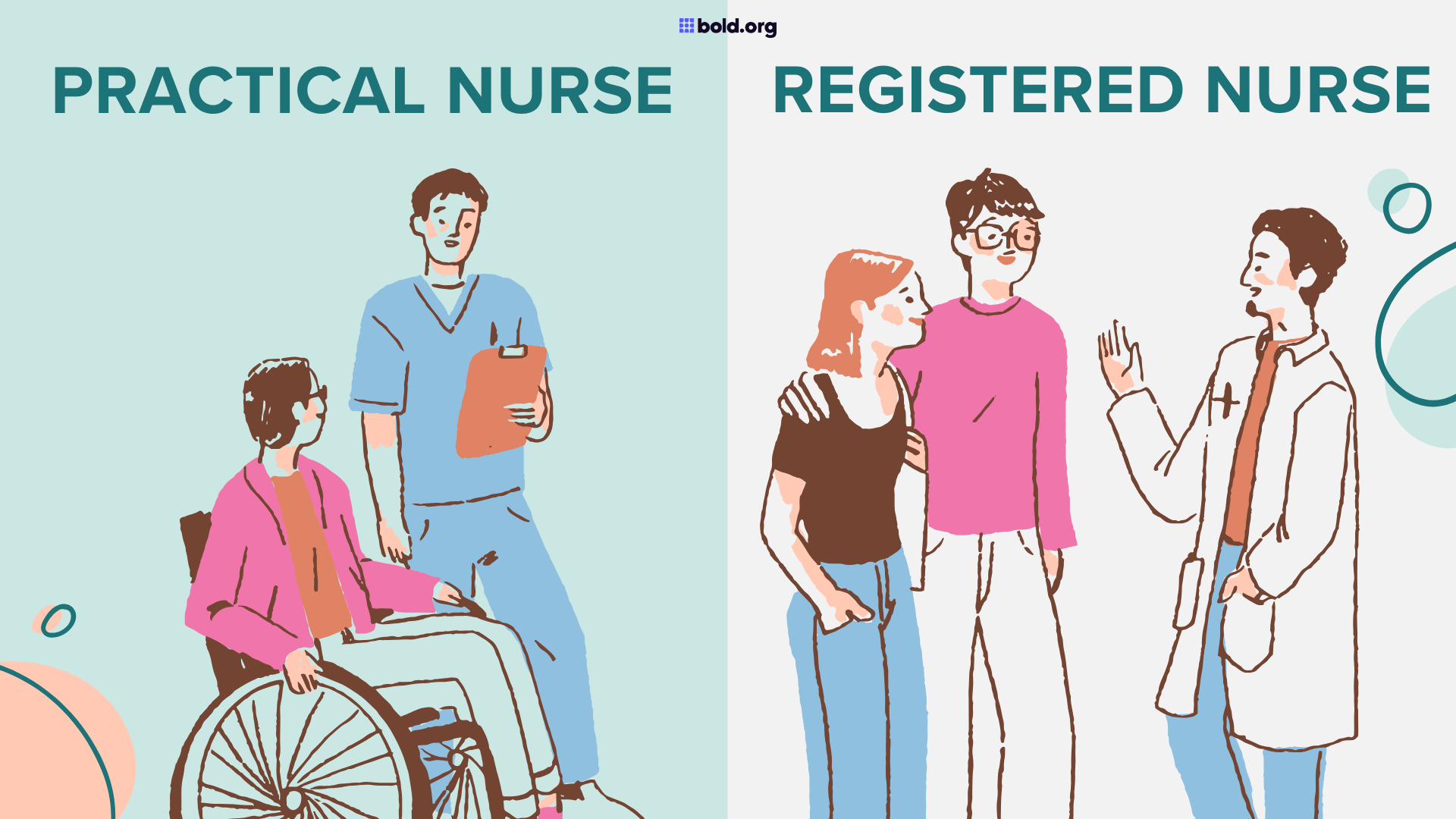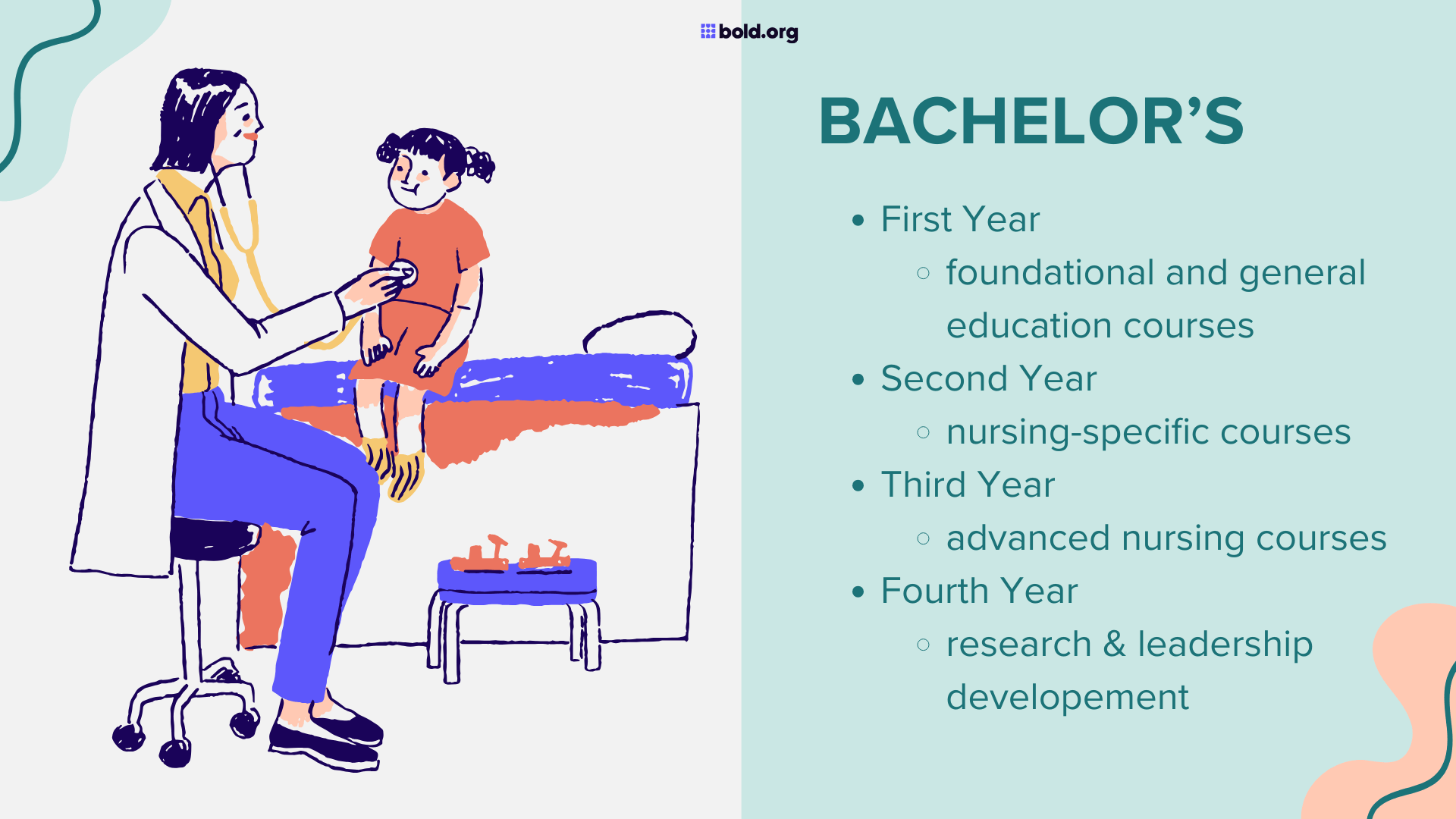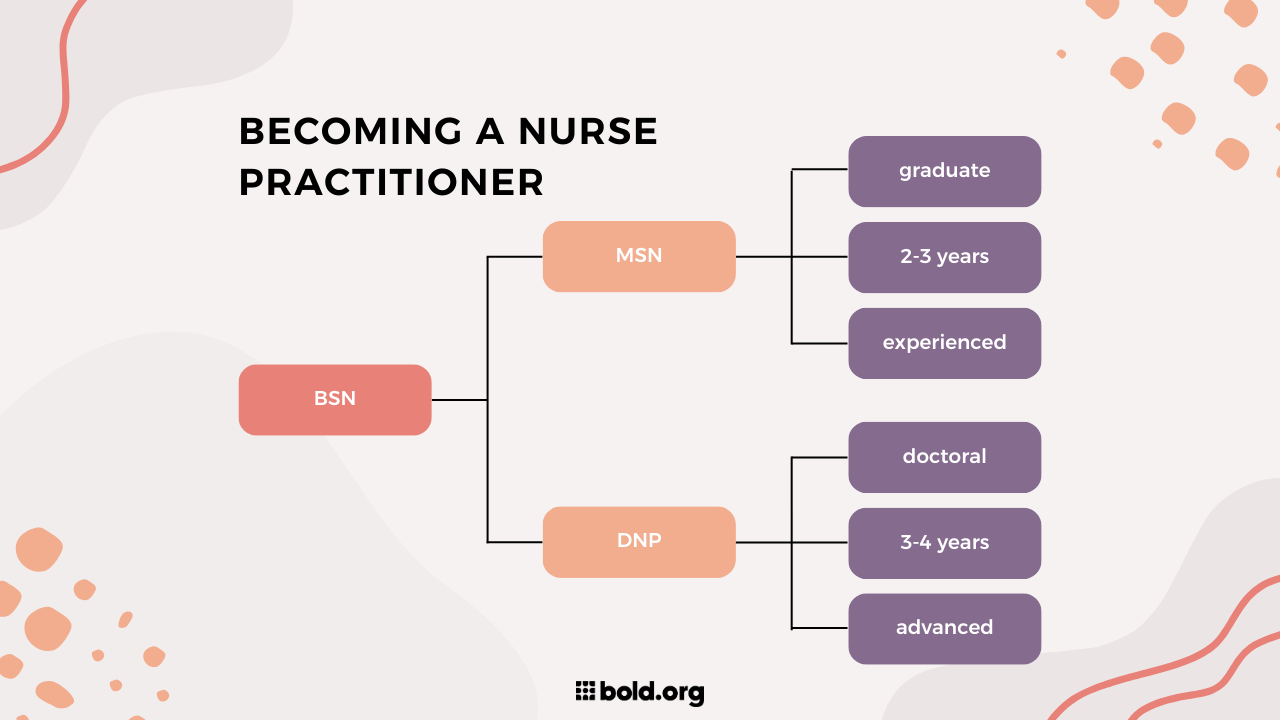How Long Is Nursing School? Degrees & Career Growth Explained


Ever wondered what it takes to become a nurse? Get all the info on the length of degrees, and how you can advance your nursing career!
Nursing is a rewarding and commendable profession that serves as the backbone of our healthcare infrastructure. With so much placed upon these invaluable medical professionals, aspiring nurses may wonder: how long is nursing school?
The path to becoming a registered nurse (RN) involves a combination of academic study, clinical experience, and licensure exams. For nursing students who wish to further their studies after a bachelor's degree, graduate school programs can add additional years to their nursing journey.
In this article from Bold.org, we'll explore the number of years it takes to become a nurse, the breakdown of each year of nursing school, and the process of becoming an RN and securing your first job after graduating.
Create a Bold.org profile to browse exclusive scholarships for college students and start saving for graduate degree programs!
Get Matched to Thousands of Scholarships
Create your Bold.org profile to access thousands of exclusive scholarships, available only on Bold.org.
Create Free ProfileHow Many Years of College Is Required to Become a Nurse?
The number of years it takes to become a nurse can vary depending on the type of nursing program and the level of education an aspiring nurse wants to pursue.
Generally, there are four main educational paths to becoming a nurse:
- Licensed Practical Nurse Program (LPN)
- diploma program for nursing students
- associate degree in nursing (ADN)
- bachelor of science in nursing (BSN)

Licensed Practical Nurse Program
A Licensed Practical Nurse (LPN) provides essential patient care under the supervision of RNs and doctors. LPN programs take about a year to complete and only require a high school degree, offering a fast entry into nursing. Licensed practical nurses typically earn less than registered nurses due to the accelerated nature of their program and often aren't qualified for more advanced nursing responsibilities.
Create Your Free Profile to Apply for Scholarships Today!Diploma Program for Nursing Students
A diploma nursing education program is offered by a hospital and focuses on training in a clinical setting. These programs usually take around two to three years to complete and prepare students to become registered nurses (RN).
While nursing diploma programs provide hands-on experience, they are less common today than they were in the past, and most nurses opt for more advanced degrees to enhance their career prospects and earning potential.
Associate Degree in Nursing (ADN)
An associate degree in nursing program usually takes two to three years to complete and is offered by community colleges and some universities. This degree provides a solid foundation in nursing and includes both classroom instruction and clinical practice.
ADN-educated nurses can become registered nurses and enter the workforce without earning a bachelor's degree. However, many registered nurses with associate degrees choose to further their education through RN-to-BSN programs, which help ADN-educated nurses increase their employability by earning a bachelor's degree.

Bachelor of Science in Nursing (BSN)
A bachelor of science in nursing degree program usually requires four years of study at a college or university. The curriculum for this program includes a comprehensive mix of theoretical and practical training, allowing students to gain a deeper understanding of medical concepts, research, and public health.
BSN-educated nurses are increasingly in demand due to their broader skill set and are more likely to pursue specialized roles, management positions, or graduate studies in nursing.
No matter which path you choose to pursue, it will cost a significant amount of money. But don't worry! Apply to these nursing scholarships and start saving now!

Breakdown of Each Year in Nursing School
Earning a nursing degree requires at least two to three years of schooling for associate degree programs and a minimum of four years of education for bachelor's degree programs. Let's explore what nursing students will learn in each year of study!
First Year
During the initial year of nursing school, students often focus on building a strong foundation in science and general education courses. Core subjects like anatomy, physiology, and biology lay the groundwork for understanding the human body and its functions, while psychology courses help develop essential communication and interpersonal skills for patient care.
Second Year
As students progress into their second year of nursing school programs, they delve deeper into nursing-specific courses, such as pharmacology and pathophysiology. These classes provide insights into the effects of medications on the body and how diseases manifest.
Simultaneously, nursing school students begin to gain hands-on experience through clinical rotations at hospitals or healthcare facilities. These help nursing students learn about the day-to-day responsibilities of RNs and understand the roles that they perform in diverse clinical environments.
Third Year
For those pursuing a BSN degree or ADN programs, the third year involves more advanced nursing courses, including community health, leadership, and nursing ethics. Students may have the opportunity to specialize in specific areas of nursing, such as pediatrics, geriatrics, or mental health, depending on their interests and program offerings.
Furthermore, clinical experiences become more intensive and specialized in the third year, giving students exposure to various healthcare settings and patient populations.
Fourth Year
For BSN programs, the final year is dedicated to advanced nursing concepts, evidence-based practice, research, and leadership development. Students might also complete a capstone project, where they apply the knowledge and skills they've gained throughout the program to a real-world healthcare issue.
Additionally, students take on more responsibility during their clinical rotations and may provide more complex, direct patient care, preparing them for the challenges of a nursing career.
Check out our scholarship blog to learn more about the best nursing schools in California and the best nursing schools in Florida!

Process of Becoming a Registered Nurse
After successfully completing their nursing programs, graduates must pass the National Council Licensure Examination for Registered Nurses (NCLEX exam) to become licensed RNs. The NCLEX exam evaluates nursing school graduates' knowledge and competency in various nursing areas, including
Once licensed, nurses can legally practice in their respective states.
The First Nursing Job After Nursing School
With their RN license in hand, new nurses can begin their job search.
There is high demand across various settings like hospitals, clinics, and home healthcare. Networking, especially through alumni connections from clinical rotations, can be key. After being hired, new nurses typically undergo an orientation and receive mentorship to help them adjust to their work environment and grow professionally.
Learn how to find a job you love in this comprehensive guide!

Becoming a Nurse Practitioner
For nurses who aspire to take on more advanced clinical roles and greater responsibilities in patient care, becoming a nurse practitioner (NP) is an excellent career progression.
Nurse practitioners are highly trained healthcare professionals and, therefore, require two to four additional years of nursing school in addition to a bachelor's degree program. There are two steps involved in this process:
- obtain a Bachelor of Science in Nursing (BSN)
- pursue a Master of Science in Nursing (MSN) OR a Doctor of Nursing Practice (DNP)
Obtain a Bachelor of Science in Nursing (BSN) Degree
The journey to becoming a nurse practitioner begins with obtaining a Bachelor of Science in Nursing (BSN). As we mentioned previously, this typically takes four years of undergraduate study at a college or university. During this period, aspiring NPs build a strong foundation in nursing theory, science, and clinical practice, similar to what is required to become a registered nurse (RN).
Pursue a Master of Science in Nursing (MSN) or Doctor of Nursing Practice (DNP) Degree
To become a nurse practitioner, BSN graduates must earn a Master of Science in Nursing (MSN) or Doctor of Nursing Practice (DNP). The choice depends on career goals, with both nursing degrees offering advanced education in nursing and clinical skills.
Master's Degree in Nursing
The Master of Science in Nursing (MSN) is a graduate degree that focuses on a specific nursing specialty, such as nurse practitioner. MSN programs, taking two to three years, emphasize clinical experience and typically require a thesis or comprehensive exam. Graduates are prepared for advanced roles, like becoming nurse educators.
Doctor of Nursing Practice Degree Programs
The Doctor of Nursing Practice (DNP) is a terminal degree that focuses on leadership, evidence-based practice, healthcare policy, and systems management, with graduates trained to integrate research into clinical practice.
Unlike a traditional dissertation, DNP programs typically require a final scholarly project. They generally take three to four years to complete, with accelerated options for those with a master's degree and a higher clinical hour requirement than MSN programs.
DNP graduates are equipped for leadership roles in healthcare, including health policy development and evidence-based practice initiatives. They often work in advanced clinical practice, administration, research, or academia.
It's never too late to decide you want to be a doctor, so don't want to miss out on these exclusive medical school scholarships!

Continuing Education and Career Advancement
As with any healthcare profession, even after completing nursing school, continuing education is essential for advanced-practice registered nurses and nurse practitioners. As a registered nurse, you'll be expected to stay current with the latest medical advancements and best practices.
Registered nurses and nurse practitioners have the opportunity to pursue additional certifications, attend workshops and conferences, and participate in research to further enhance their clinical expertise and career opportunities.
Studying is not just a college skill but a lifelong one as you keep up with innovations and research in the nursing field. Learn all about proven studying habits and techniques to keep you at the top of your game!

Frequent Asked Questions About Nursing School
What is the fastest way to become a registered nurse?
The fastest way to become a registered nurse is by earning an Associate Degree in Nursing (ADN), which typically takes two to three years to complete at a community college. After earning an ADN, you can pursue a Bachelor of Science in Nursing (BSN) through accelerated programs designed for registered nurses with an associate degree.
What is the highest-paid nurse?
The highest-paid nursing professionals are typically Certified Registered Nurse Anesthetists (CRNAs), who specialize in administering anesthesia. CRNAs can earn an average salary exceeding $180,000 per year, depending on their experience and location. Their advanced training and critical role in patient care contribute to their high earning potential.
What careers are available for nursing graduates?
Nursing graduates with an associate degree in nursing or a bachelor of science in nursing are able to work in healthcare facilities as registered nurses. Nurses who go on to earn a master's degree or doctor of nursing practice degree can further specialize as nurse anesthetists, nurse educators, and a clinical nurse specialist. The nursing profession is a wide and varied field, with something in store for everyone! associate degree
Don't forget to check out our scholarship blog to read more about the best nursing schools in the United States and tips for applying to college!